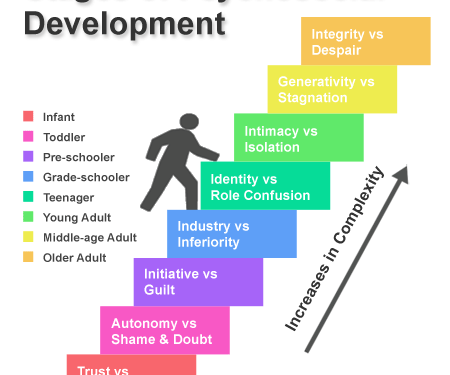Working in a legislative office, I’ve come to learn that people are always at least 20 steps in advance of the institutions of learning, government, healthcare and others providers whom we turn to for help and leadership. As a result, much of what we are taught is the way things were and not the way things are.
This phenomenon is nowhere better illustrated than in the case of Erikson’s Stages of Development in his lifespan theory. From the day I walked into my first casework class in social work school, I realized that the prevailing academic view of the lifespan after adolescence was out of sync with reality.
Remember these last three life stages from Erikson’s 8 stages of development?
6. intimacy vs. isolation, ages 21-40 (Adulthood Stage I)
7. generativity vs. stagnation, ages 40-65 (Adulthood Stage II)
8. ego integrity vs. despair, ages 65+ (Senior)
When I look at this, my first reaction is “oh my, it looks like 65 is the end of life.”
As I age and would now be considered a “senior”, I have come to realize that the stages along the lifespan are not fixed. No, rather it is a process that is ever-changing, fluid, and flexible. Mixed into this process is the huge diversity of human experience and culture that characterize the elder generation.
Recently, I have become aware that there is a new stage of life, not yet considered or noticed by the keepers of knowledge. Those of us who are somewhere between 60 and 80 are often a broad and flexible age group which tends to be difficult to generalize. Therefore, no real place in society.
Just as adolescence as a developmental transition between childhood and adulthood was not always considered a life stage, so the “older boomers” or the “young old” are now in that same state of irrelevance in our culture. Nobody, including ourselves, knows what to call us. It seems to me that we are in our own developmental transition between adulthood and seniorhood.
Before psychologist G. Stanley Hall (1844-1924) coined the term adolescence and studied it as a distinct developmental period, our society considered adolescence a luxury. It is reported that perhaps the real reason there arose the developmental period of adolescence was to delay young people from going into the workforce, due to the scarcity of jobs.
Today, we the “young old”, are being pushed out of the workforce. Could it be for the same reason? When we leave our career jobs, whether by choice or not, we step into a void, a world that has left no space for us. We are truly the invisible generation, searching for an identity. People start offering us seats on the bus, but many of us are not ready to sit down. We are too old by some standards, and too young by others. What we are searching for is a way to remain relevant in today’s world. A friend said to me recently, “I don’t mind getting old, but I do mind becoming irrelevant.”
If one looks at the new longevity statistics, you might come to the conclusion that these extra years are just added on to the end of our lives. Yet, that is not at all what is happening. What has happened is a whole new stage of life has opened up. No longer are 65 year olds edging toward the end of their lives. If they are relatively healthy, they actually have a long way to go. And, they are not going to Florida to play golf and bingo.
So maybe it’s time to rethink the stages along the human lifespan. Just as young people are taking longer to enter adulthood, those of us in the over 65 category are taking longer to enter seniorhood. Maybe those young adults need to create a new life stage for themselves just as we, the old boomers, are creating our own new stage of life.
Now, what we need is for society to accept it?




